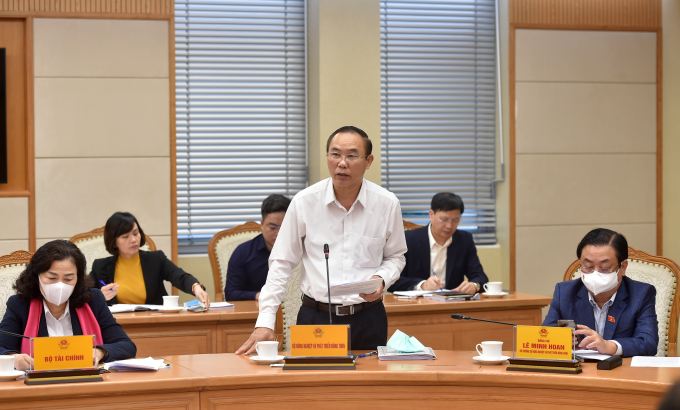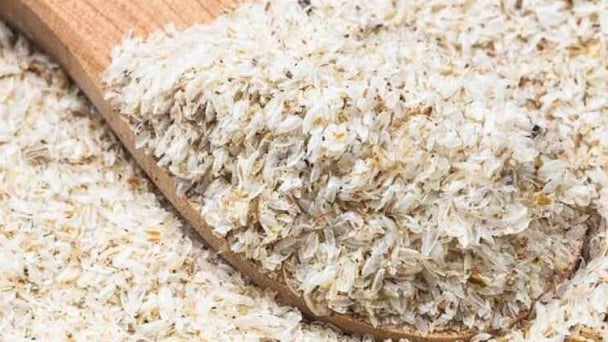May 28, 2025 | 19:56 GMT +7
May 28, 2025 | 19:56 GMT +7
Hotline: 0913.378.918
May 28, 2025 | 19:56 GMT +7
Hotline: 0913.378.918

Deputy Prime Minister Le Van Thanh has stated that the Prime Minister, ministries, sectors and localities will have urgent solutions to support consumption and gradually stabilize prices to ensure benefit equality for all partners. Photo: Duc Tuan.
Stating that "there should be solutions to support those who are suffering from a large backlog of pigs that have not been consumed yet", Deputy PM Le Van Thanh has assigned the Ministry of Finance to study and propose financial solutions to support livestock farmers.
The Deputy PM chaired a meeting on the afternoon of October 22 at the Government Office to assess the current situation of pork production and consumption. The meeting was held to find solutions for strengthening management, stabilizing market prices to ensure benefits for farmers and consumers as well as stabilizing production.
Attending the meeting were leaders of the Ministries of Agriculture and Rural Development, Industry and Trade, Finance, Transport, Public Security, the Government Office and the Steering Committee 389.
According to reports from ministries and functional agencies, prices of live hogs have continuously decreased since the beginning of the year. Especially from September until now, the price of live hog has decreased sharply to VND70.000-75.000/kg in March and April. In August and September, it stood only at VND42,000-50,000/kg, and now, it is fluctuating at about VND35,000-45,000/kg. Especially in some localities, the price was even below VND35,000/kg. In the last 2-3 days, it has slightly increased by VND2,000-3,000/kg.
Meanwhile, prices of animal feed have been increasing, causing difficulties for household farmers, especially small-scale ones. Prices of livestock products in general and prices of live hogs, in particular, are still at a low level thus farmers are suffering from losses. This will threaten the production and supply sources in the coming months, especially during the Lunar New Year if we do not have a suitable, effective solution.
At this meeting, leaders of ministries and related agencies spoke out to clarify the reasons for such a sharp decrease in prices, which they said was about a drop in demands in addition to difficulties in circulation and transportation. Besides, some local production and processing units had to temporarily suspend operations because they could not meet the "3 on-site" requirements during the social distancing.
Meanwhile, supply sources are abundant not only in pork meat but also in other food products such as chicken and seafood. By the end of September and the beginning of October 2021, the country's total pig herd was over 28 million heads (ranked 6th in the world), an increase of 5% with the live pork production in 9 months reaching about 2.9 million tons.

Deputy Minister of Agriculture and Rural Development Phung Duc Tien: “Transportation and goods circulation have been smooth due to the coordination between ministries. In recent days, chicken and pork prices have increased again.” Photo: Duc Tuan.
Explaining more about the reasons, MARD Deputy Minister Phung Duc Tien said that due to the Covid-19 pandemic, many provinces and cities across the country had to follow social distancing. Industrial parks, processing zones, schools, restaurants, hotels and all markets were closed resulting in a significant decrease by 30-50% in consumer demands for food.
Up to now, although localities have been in normal conditions, workers from local areas have not returned to big cities to work, Schools are still closed, restaurants are open just for welcoming a number of guests so food consumption is limited. Meanwhile, the cycle of production, growth, and herd repopulation is still taking place normally.
This circumstance has led to a stagnation in product consumption. “Ho Chi Minh City alone needs to consume 60 tons of food a day but it now can produce less than 10% of it. All other quantity is imported from western provinces. Therefore, livestock products are now congested in localities making prices to be reduced," said Deputy Minister Tien as an example.
Faced with that situation, the MARD decided to set up two working groups in the North and South to organize traffic connections, boost export and promote trade.
The Ministry convened such a meeting to remove obstacles, especially those in exports to Japan and South Korea. MARD Deputy Minister Tien assessed that exports have had positive changes, creating favorable conditions for businesses to invest in the high-tech industry in chains from seed, feed, slaughtering, processing and consumption. “With the coordination between ministries, transportation and goods circulation have been smooth. In recent days, chicken and pork prices have increased again,” he said.

Deputy Minister of Industry and Trade Do Thang Hai: “It is necessary to strengthen communication activities on market prices and supply sources during the pandemic to avoid a shortage of information and market instability. Photo: Duc Tuan.
Recalling the same period last year, Deputy Minister of Industry and Trade Do Thang Hai emphasized the market supply and demand issue saying that the price last year was high while this year it was low.
The pork market in the first 9 months of 2021 is completely different from the same period last year due to the abundant supply and influence of the Covid-19 pandemic. Consumption demand decreased sharply (of which the main reason is about unstable operation activities of restaurants and hotels, especially in southern provinces).
Meanwhile, the supply is abundant (not only in pork meat but also in other foods such as chicken and seafood) but livestock production unit increased their herds and face backlogs as not beeing consumed over in the past leading to an overage of the pigs.
However, the current situation is identified that the price of pork products has not decreased commensurately with the price of live hogs. The price of pork products is popular at VND60,000-100,000/kg at normal markets and VND98,000-130,000/kg at supermarkets.
Deputy Minister Hai further clarified that in the pork price structure, an average of 100kg of live hogs can give about 55-60kg of meat. Thus, the proportion of live hog price only accounts for 55-60% of the pork. Other costs remain the same or increase (labor costs, testing, transportation...), so the price of pork do not decrease to the same level as live hog price.
At the same time, depending on consumers’ preferences and the percentage of pork products, different types of pork are sold at different prices.
The Ministry of Industry and Trade representative said that it was necessary to strengthen communication activities on market prices and supply during the pandemic in order to enhance consumer understanding about prices of pork and avoid a lack of information that causes market instability.
At the meeting, participants also proposed some immediate and long-term solutions to remove burdens for pig production, help farmers reduce their difficulties and have more conditions to re-herd.

Deputy PM Le Van Thanh: “Finding the causes and focusing on solutions for this issue are very necessary because it affects tens of millions of people. Photo: Duc Tuan.
Concludingly, Deputy Prime Minister Le Van Thanh said that the difference between the pork selling price and the price of live hogs is unreasonable. "Finding the cause and focusing on solving it are very essential" because it affects tens of millions of people," he added.
Operation following the market mechanism, however, in the current context, needs to have authorized solutions from the State agencies.
Referring to the cause, the Deputy Prime Minister agreed that, first of all, due to the impact of Covid-19, many localities had to follow social distancing, leading to a decrease in demand. Farmers were unable to sell their pigs but face stagnation and over-breeding, for which, according to the MARD, when the weight exceeds 120kg/head, it is more difficult to sell.
Besides, it is the cause in production, circulation, distribution chain, or the economic recovery which is being implemented quite well but not synchronously. Consumers’ access to the market has also not been good as expected.
From the above situation and causes, sharing difficulties with farmers, the Deputy Prime Minister said that the Prime Minister, ministries, agencies and localities will urgently have solutions to support consumption, gradually stabilize the prices so that to ensure harmonious benefits for all parties including breeders, traders, and consumers.
Stating that "there should be solutions to support breeders who have a large inventory of pigs that cannot be sold", the Deputy Prime Minister assigned the Ministry of Finance to study and propose solutions to financially support them.
Ministries, agencies, localities and major economic centers must accelerate the economic recovery. The Ministry of Industry and Trade should urgently organize meetings and work with localities to restore the operation of wholesale and traditional markets in the spirit of Resolution 128; opening price-stabilizing stores to promote consumption.
The Deputy PM also requested to organize the inspection, examination and clarification of costs of each stage in the value chain, an inspection of the differences in selling prices (between the price of live hogs and price of pork products at normal markets and supermarkets); review the pork import and export; promptly handle violations, if there are. The MARD should assume the prime responsibility for, and coordinate with relevant agencies and localities in propagandizing and working specifically with processing units, large consuming households, and enterprises with large storage and processing capacity to promote consumption and use of domestic meat products to help reduce difficulties for farmers.
At the same time, he ordered to strengthen the management of input products’ selling prices, especially animal feed and veterinary medicine; set plans for re-herding and growing according to market signals especially for the year-end and Lunar New Year holidays. The Ministry of Transport should review and manage the circulation and transport system so that to reduce difficulties for consumers in accessing markets and ensure a smooth and united goods circulation across the country.
Translated by Linh Nguyen

(VAN) The import-export turnover between Vietnam and Singapore rose amid a trade rebound, with machinery, electrical equipment, and fuels making up the majority of the transaction value.

(VAN) Director General of the General Administration of Customs of China, Ms. Sun Mai Jun, has pledged to implement measures that will ease the import process for Vietnamese agricultural products.

(VAN) Although Vietnam is still increasing its coffee exports, the industry is currently in the process of determining market strategies in response to the U.S. imposition of reciprocal tariffs.

(VAN) With rising demand in Muslim-majority countries, Halal certification is becoming a critical passport for Vietnamese agricultural products seeking sustainable market access and consumer trust in the Middle East and Africa.

(VAN) Vietnam’s fruit and vegetable exports to the U.S. are rising sharply, and exporters are hoping that any upcoming reciprocal tariffs will be set at manageable levels.

(VAN) Despite meeting quality standards, Vietnamese rice bran exporters still face difficulties with administrative procedures under the new protocol.

(VAN) The U.S. is tightening import tariffs and origin inspections, requiring Vietnamese businesses to proactively prepare in terms of legal compliance, supply chains, and appropriate export strategies.